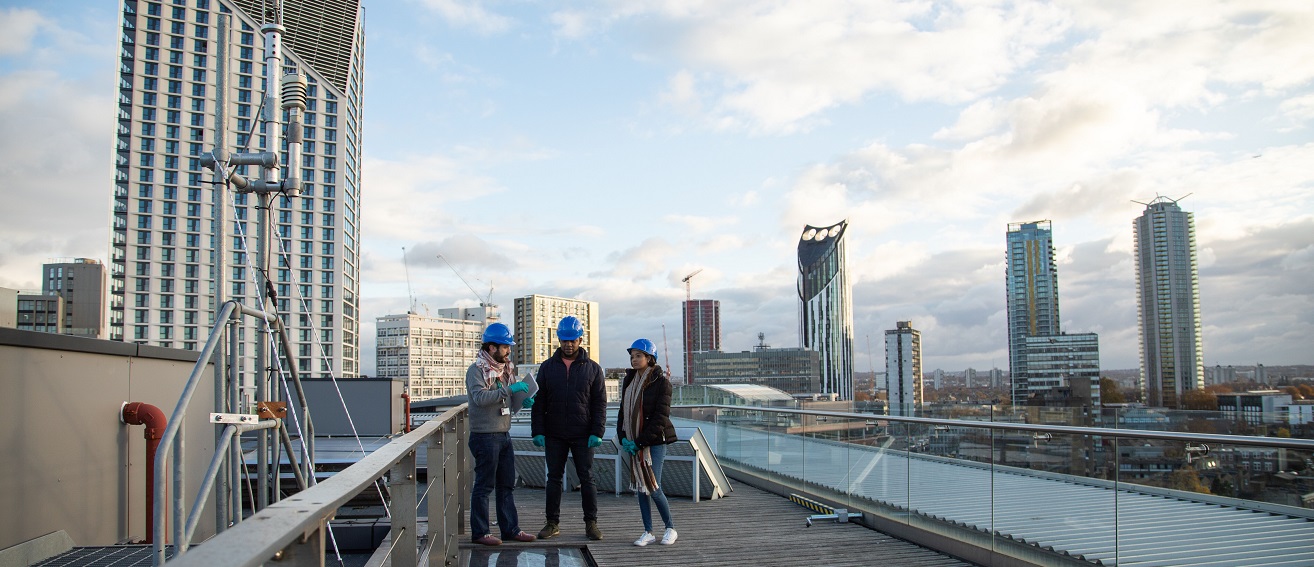Search our site...
Search module
Overview
The engineers that made the world
From the rebuilding of inner cities to remarkable constructions like the Channel tunnel, the world is full of building and infrastructure projects that couldn’t happen without civil engineers. This course has been developed with input from our Industrial Advisory Panel to give a practical design-orientated course which will equip you with the skills and qualifications you need to join the construction industry.
On this course you will learn a huge range of engineering principles including fluid mechanics, engineering surveying and structural design and analysis. Our students have access to software that will allow you to design and analyse civil engineering problems, as well as communication via presentations, ethics and legal responsibilities and how the industry operates as a team within practice.
If you intend to do a part-time degree at LSBU, we advise taking the HNC route, as it is closely integrated into our degree programmes. Year 2 of the HNC is also designed for graduates from other fields, now working in civil engineering.
Why Civil Engineering at LSBU?
- star
Ranked 3rd for teaching quality in the UK (Sunday Times Good University Guide 2020).
- check-circle
- Accredited by the Engineering Council as fully satisfying the educational base for an Engineering Technician.
- power-off
- Industry relevant: Our Industry Advisory Panel advises on course content.
- trophy
- The teaching team is active in research or consultancy work, and there are frequent industrial expert visits.
- level-up-alt
- Academic progression: Progress to degree level via a part-time route.
- clock
- Day release route: Allows for completion of course while maintaining work commitments.
- fa fa-users
- From AI machine learning boot camp to silent film processing, there is a range of extracurricular activities for Engineering students to get involved in.
| ModePart-time | Duration2 years | Start dateSeptember | Application code2314 | Application method Direct to LSBU |
| ModePart-time (Jersey) | Duration2 years | Start dateSeptember | Application code5367 | Application method Direct to LSBU |
Location
London South Bank University student union is located at 103 Borough Rd, London SE1 0AA.
If you are visiting our Southwark Campus, you may wish to use our downloadable campus map (PNG File 466 KB). For information on accessibility, see our DisabledGo access guides. See our location page for more details.
Entry Level Requirements
64 UCAS points
Or equivalent level 3 qualifications.
If you do not meet the entry criteria above we also review any previous skills, knowledge or experience you have gained outside of your education and are happy to talk through any extenuating circumstances you feel relevant.
Visit UCAS for guidance on the tariff.
Choose your country
Select country here:
Missing English and Maths qualifications?
If you do not have the required English and Maths qualifications needed to satisfy the entry requirements for this programme, we have courses available at our partner College that you can take to upskill in these areas. Find out more at South Bank College.
Advanced entry
If you have already completed some studies at another university, we may be able to consider you for advanced entry. Please see our advanced entry page for more information.
United Kingdom
£4625
Tuition fees for home students
International
£7450
Tuition fees for international students
Tuition fees are subject to annual inflationary increases. Find out more about tuition fees for Undergraduate or Postgraduate courses.
-
Part-time
part-time
HNC Civil Engineering (PT) - Year 1
UK fee: £4625 International fee: £7450 AOS/LSBU code: 2314 Session code: 1PS00 Total course fee: UK: £9250 International: £14900 HNC Civil Engineering (PT) - Year 2
UK fee: £4625 International fee: £7450 AOS/LSBU code: 2314 Session code: 2PS00 Total course fee: UK: £9250 International: £14900
For more information, including how and when to pay, see our fees and funding section for undergraduate students.
Please check your fee status and whether you are considered a Home, EU or International student for fee-paying purposes and for our regulatory returns, by reading the UKCISA regulations.
See our Tuition Fees Regulations (PDF File 391 KB) and Refund Policy (PDF File 775 KB).
Possible fee changes
The University reserves the right to increase its fees in line with changes to legislation, regulation and any government guidance or decisions.
The fees for international students are reviewed annually and the University reserves the right to increase the tuition fees in line with the RPIX measure of inflation up to 4 per cent.
Scholarships
We offer several types of fee reduction through our scholarships and bursaries. Find the full list and other useful information on our scholarships page.
International students
The course is not currently open to international students.
International (non Home) applicants should follow our international how to apply guide.
Home
| Mode Part-time | Duration 2 years | Start date September | Application code 2314 | Application method Direct to LSBU |
| Mode Part-time (Jersey) | Duration 2 years | Start date September | Application code 5367 | Application method Direct to LSBU |
Accommodation
Once we have made you an offer, you can apply for accommodation. You can rent from LSBU and you’ll deal directly with the university, not third party providers. That means we can guarantee you options to suit all budgets, with clear tenancy agreements and all-inclusive rents that include insurance for your personal belongings, internet access in each bedroom and on-site laundry facilities.
Or, if you’d rather rent privately, we can give you a list of landlords – just ask our Accommodation Service.
Read more about applying for accommodation at LSBU.
Finance
You don't need to wait for a confirmed place on a course to start applying for student finance. Read how to pay your fees as an undergraduate student.
Prepare to start
Applicant events
After you’ve received your offer we’ll send you emails about events we run to help you prepare for your course.
Enrolment
Before you start your course we’ll send you information on what you’ll need to do before you arrive and during your first few days on campus. You can read about the process on our Enrolment pages.
The course explores the fundamentals of civil engineering, leaving you well prepared for entry on to the full degree programme. It covers mathematics, engineering mechanics, construction technology, and practice skills.
If you intend to do a part-time degree at LSBU, we advise taking the HNC route, as it is closely integrated into our degree programmes. Year 2 of the HNC is also designed for graduates from other fields, now working in civil engineering.
Year 1
- Materials and geology
This module will introduce you to the properties and applications of a variety of engineering materials, including some innovative materials. In addition, it will introduce you to engineering geology and geomaterials (rock and soils). Whilst traditional lectures and laboratories will be used as a means of delivering the course content, there will also be emphasis on the teaching in the field through site visits. Assessment methods: 50% coursework, 50% exam. - Construction practice
This module aims to provide you with the knowledge of the interrelationships between industry, professional bodies and education, and an understanding of key professional and research requirements. It will provide you with a roadmap for your professional career, and will enable you to prepare for employment in the construction discipline. Assessment method: 100% coursework. - Fluid Mechanics B
This module teaches fundamental principles of fluid mechanics, and their practical applications. The student will be able to understand the fundamental principles of fluid mechanics relating to hydrostatic and hydrodynamic forces, sediment transport, measurement of pressure, the stability of floating bodies, coastal and flood engineering, air flow around structures and flow in simple pipes and open channels. The student will perform fluid flow laboratory tests, workshops and prepare reports and presentations. Assessment Methods: 50% Coursework, 50% Exam.
Year 2
- Structures and construction technology B
This module will teach you the fundamentals of structural mechanics and strength of material, and you'll use numerous worked examples to complement your understanding. You'll be introduced to a computer aided analysis package. You'll reinforce your understanding of structural concepts by studying some well known historical failures. Finally, you'll develop introductory principles of structural engineering design though open-ended exercises and case studies. Assessment methods: 50% coursework, 50% exam. - Engineering surveying
This module will introduce you to the basic theory and practice of land surveying, particularly as it applies to civil engineering. You'll learn or revise the main concepts of three-dimensional geometry and relate them to practical surveying exercises. You'll be taught to use various pieces of surveying equipment, including tape, level, theodolite and total station. You'll learn how measurements are taken and booked, and how to carry out various relevant computations, including the assessment of error and the calculation of reduced level, coordinates and bearings. You'll use the knowledge you've acquired to carry out a field project. This project will involve tape and offset survey, levelling, traversing and calculation of volume. In addition you'll learn to carry out simple setting out procedures, including the analysis and setting out of curves, and you'll be introduced to the concepts of GPS and its associated technology. You'll learn the associated surveying calculations, adjustment and analysis of survey observations. Finally, you'll gain an appreciation of the need for a quality management process/system in undertaking practical work. Assessment methods: 50% coursework, 50% exam. - Mathematics B
This module consolidates the mathematical skills that underpin the Civil Engineering degrees. It's specifically designed to cater for the wide differences in mathematical background of students to reach an equivalent A-level maths and then extending it by introducing the main mathematical techniques that are required in the early stages of Civil engineering degrees. The module is delivered over two semesters. Assessment methods: 50% coursework, 50% exam.
Careers
Employability Service
At LSBU, we want to set you up for a successful career. During your studies – and for two years after you graduate – you’ll have access to our Employability Service, which includes:
- An online board where you can see a wide range of placements: part-time, full-time or voluntary. You can also drop in to see our Job Shop advisers, who are always available to help you take the next step in your search.
- Our Careers Gym offering group workshops on CVs, interview techniques and finding work experience, as well as regular presentations from employers across a range of sectors.
Our Student Enterprise team can also help you start your own business and develop valuable entrepreneurial skills.
You'll develop a wide range of employability skills through our vocational approach to teaching and a focus on a range of technical knowledge and skills.
Graduate success stories
Recent students from this course have gone onto jobs such as: Project Manager, Quantity Surveyor, Senior Structural Technician, Civil Engineer and Network Maintenance Manager.
Continuing to degree level qualifications
If you complete this course, you will be able to apply for further study at undergraduate level.
If you excel at HNC level, you may be offered advanced entry to the Honours degree programme, subject to meeting minimum professional experience levels.
Accreditation
This qualification is approved by the Joint Board of Moderators (JBM) comprising the Institution of Civil Engineers, Institution of Structural Engineers, Institute of Highway Engineers, and the Chartered Institution of Highways and Transportation on behalf of the Engineering Council as fully satisfying the educational base for an Engineering Technician (EngTech).
See the JBM website for further information.

- The Institution of Civil Engineers is a qualifying body, a centre for the exchange of specialist knowledge, and a provider of resources to encourage innovation and excellence in the profession.

- The Chartered Institution of Highways and Transportation is concerned specifically with planning, design, construction, maintenance and operation of land-based transport systems and infrastructure. It has 12,000 members.

- The Institution of Structural Engineers is the world's leading professional body for qualifications and standards in structural engineering.

- The Institute of Highway Engineers (formerly the Institute of Highway Incorporated Engineers) is the professional institution for practitioners in highway and traffic engineering, offering Engineering Council registration and professional development support.
Teaching and Assessment
Personal Tutoring
As a Built Environment and Architecture student, you will be allocated a named tutor during your first three weeks at LSBU. The role of your tutor is to be your primary contact for academic support. Your personal tutor will be the same person throughout your course.
Your tutor will support you to get the most of your time at LSBU, providing advice and signposting to other sources of support in the University.
Your tutor should be the first person at the university that you speak to if you are having any difficulties that are affecting your work. These could be academic, financial, health-related or another type of problem.
You will have meetings with your personal tutor periodically. One-on-one meetings can be arranged on request. You can contact your tutor for additional support by email or in person.



